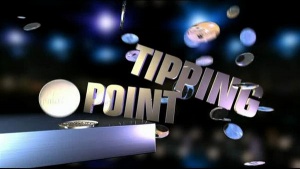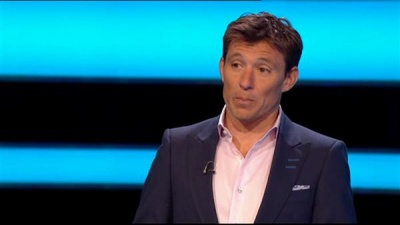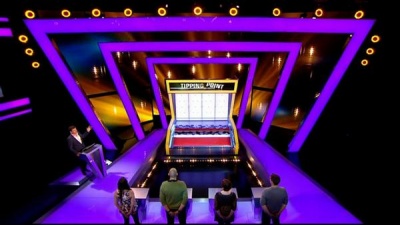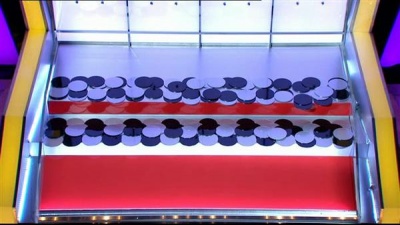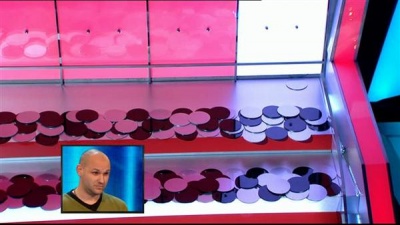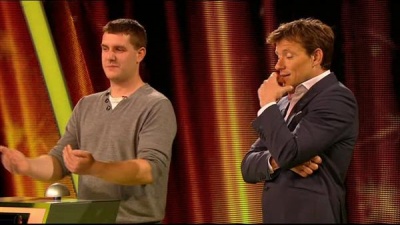Tipping Point
(→Synopsis: Actually, I have a far bigger concern about this show, but its expression requires more delicacy than I feel able to put into it at this moment.) |
|||
| Line 1: | Line 1: | ||
| - | [[File:Tipping point title.jpg|300px]] | + | <div class="image">[[File:Tipping point title.jpg|300px]]</div> |
<div class="box"> | <div class="box"> | ||
| + | |||
== Host == | == Host == | ||
| Line 19: | Line 20: | ||
Back in the day, seaside arcades were full of those mechanical contraptions that push 2p coins so that they fall, and push other coins down, and cascade to win as much as eight new pence. | Back in the day, seaside arcades were full of those mechanical contraptions that push 2p coins so that they fall, and push other coins down, and cascade to win as much as eight new pence. | ||
| + | |||
| + | <div class=image>[[File:Tipping point ben shephard.jpg|400px]]''Ben making a face of a Shephard.''</div> | ||
''Tipping Point'' has such a machine - an enormous one, filled not with coins but with counters. The back board is split into four “zones”, and by answering questions correctly contestants can press a button to drop another counter into a zone where it will bounce around Plinko-style for a bit then fall onto the coin shelf which goes back and forth slowly. If this pushes other counters into the “win zone” then you score £50 for each one. | ''Tipping Point'' has such a machine - an enormous one, filled not with coins but with counters. The back board is split into four “zones”, and by answering questions correctly contestants can press a button to drop another counter into a zone where it will bounce around Plinko-style for a bit then fall onto the coin shelf which goes back and forth slowly. If this pushes other counters into the “win zone” then you score £50 for each one. | ||
| + | |||
| + | <div class=image>[[File:Tipping point set.jpg|400px]]''The set that brings you into the void.''</div> | ||
Four players start. In round one, each player gets three counters. Questions are asked on the buzzer. Get a question right and you can choose to either play one of your counters or force someone else to play one of theirs (if it doesn’t look like paying out). If you buzz in and get it wrong then one of your counters is put into the “penalty pot”. At the end of the round, one sudden death question decides who gets to play the penalty counters. | Four players start. In round one, each player gets three counters. Questions are asked on the buzzer. Get a question right and you can choose to either play one of your counters or force someone else to play one of theirs (if it doesn’t look like paying out). If you buzz in and get it wrong then one of your counters is put into the “penalty pot”. At the end of the round, one sudden death question decides who gets to play the penalty counters. | ||
| + | |||
| + | <div class=image>[[File:Tipping point shelves.jpg|400px]]''Imagine bringing this beast into your local arcade.''</div> | ||
At the end of the round, the player with the lowest score is eliminated and leaves with nothing. In the event of a tie, the elimination is decided by a sudden-death question only for the players involved. | At the end of the round, the player with the lowest score is eliminated and leaves with nothing. In the event of a tie, the elimination is decided by a sudden-death question only for the players involved. | ||
| + | |||
| + | <div class=image>[[File:Tipping point drops.jpg|400px]]''Please let my sob story win £10,000.''</div> | ||
In round two, the person with the highest score gets to determine the order of play. Each person gets thirty seconds of rapid fire questions earning one counter for each right answer. At the end of the time they then get to drop the counters. Again, the lowest total score is eliminated. | In round two, the person with the highest score gets to determine the order of play. Each person gets thirty seconds of rapid fire questions earning one counter for each right answer. At the end of the time they then get to drop the counters. Again, the lowest total score is eliminated. | ||
| Line 31: | Line 40: | ||
For the endgame, the winning contestant puts the jackpot counter into play, it’s slightly larger and more shiny than the other ones, and has a star on it. They do this by picking a zone and letting it fall as normal. If the contestant can get it out again, they’ll earn £10,000. Any other counters that fall are worth the standard £50. There are six categories of questions. For each one the contestant can take a 1, 2 or 3 difficulty counter question depending on how confident they are. If they get it right, they can drop that many counters into the machine. If they are wrong they earn zero. If the contestant has not removed the jackpot counter by the end of the last question, they have the option of taking their current winnings home with them or trading them in for three more counters, but then it is all or nothing. | For the endgame, the winning contestant puts the jackpot counter into play, it’s slightly larger and more shiny than the other ones, and has a star on it. They do this by picking a zone and letting it fall as normal. If the contestant can get it out again, they’ll earn £10,000. Any other counters that fall are worth the standard £50. There are six categories of questions. For each one the contestant can take a 1, 2 or 3 difficulty counter question depending on how confident they are. If they get it right, they can drop that many counters into the machine. If they are wrong they earn zero. If the contestant has not removed the jackpot counter by the end of the last question, they have the option of taking their current winnings home with them or trading them in for three more counters, but then it is all or nothing. | ||
| + | |||
| + | <div class=image>[[File:Tipping point ben tense.jpg|400px]]''Ben now realises why this show came second in the Hall of SHAME.''</div> | ||
Since 2015, the machine has contained two "double" counters, which (yes) double the value of any counters that drop with them (they also score double £50 - that's £100, maths trivia fans - in their own right). About once a week, somebody gets such a massive doubled drop in the first round that the next two rounds become a bit of a foregone conclusion. | Since 2015, the machine has contained two "double" counters, which (yes) double the value of any counters that drop with them (they also score double £50 - that's £100, maths trivia fans - in their own right). About once a week, somebody gets such a massive doubled drop in the first round that the next two rounds become a bit of a foregone conclusion. | ||
Revision as of 21:28, 22 January 2017
Contents |
Host
Broadcast
RDF Television for ITV1, 2 July 2012 to 29 August 2014 (199 episodes in 4 series + 1 unaired)
Fizz for ITV, 5 January 2015 to present
as Tipping Point: Lucky Stars: 9 June 2013 to present
Synopsis
Back in the day, seaside arcades were full of those mechanical contraptions that push 2p coins so that they fall, and push other coins down, and cascade to win as much as eight new pence.
Tipping Point has such a machine - an enormous one, filled not with coins but with counters. The back board is split into four “zones”, and by answering questions correctly contestants can press a button to drop another counter into a zone where it will bounce around Plinko-style for a bit then fall onto the coin shelf which goes back and forth slowly. If this pushes other counters into the “win zone” then you score £50 for each one.
Four players start. In round one, each player gets three counters. Questions are asked on the buzzer. Get a question right and you can choose to either play one of your counters or force someone else to play one of theirs (if it doesn’t look like paying out). If you buzz in and get it wrong then one of your counters is put into the “penalty pot”. At the end of the round, one sudden death question decides who gets to play the penalty counters.
At the end of the round, the player with the lowest score is eliminated and leaves with nothing. In the event of a tie, the elimination is decided by a sudden-death question only for the players involved.
In round two, the person with the highest score gets to determine the order of play. Each person gets thirty seconds of rapid fire questions earning one counter for each right answer. At the end of the time they then get to drop the counters. Again, the lowest total score is eliminated.
In round three, six questions are asked alternately of the two remaining contestants. They can opt to answer themselves or pass to their opponent. A correct answer earns the right to play a counter, a wrong answer gives the counter to the opponent. Lowest score after six questions is out.
For the endgame, the winning contestant puts the jackpot counter into play, it’s slightly larger and more shiny than the other ones, and has a star on it. They do this by picking a zone and letting it fall as normal. If the contestant can get it out again, they’ll earn £10,000. Any other counters that fall are worth the standard £50. There are six categories of questions. For each one the contestant can take a 1, 2 or 3 difficulty counter question depending on how confident they are. If they get it right, they can drop that many counters into the machine. If they are wrong they earn zero. If the contestant has not removed the jackpot counter by the end of the last question, they have the option of taking their current winnings home with them or trading them in for three more counters, but then it is all or nothing.
Since 2015, the machine has contained two "double" counters, which (yes) double the value of any counters that drop with them (they also score double £50 - that's £100, maths trivia fans - in their own right). About once a week, somebody gets such a massive doubled drop in the first round that the next two rounds become a bit of a foregone conclusion.
The question setters' pet subjects seem to be Harry Potter, fashion, and the royal family, which are only to be expected in an ITV daytime show, and more usually, technology companies. A Tipping Point drinking game would certainly need to assign some forfeit to any mention of Apple, Microsoft or Google. These are perfectly valid areas of knowledge, it's just unusual, and maybe a tad overdone, is all. The question setters also love ridiculously obscure Food and Drink questions - whenever that category comes up in the final round, expect a blind guess.
Speaking of the final round, a slightly bigger concern is that the difficulty of the questions doesn't seem to be very well calibrated. We find it impossible to distinguish between two- and three-point questions, and even the few one-point questions we get to hear, don't seem that easy. Sometimes (i.e. all the time), we wonder whether the choice of 1, 2 or 3 points actually makes any difference to the question at all. Were we playing, we'd just go for three points every time. Even on a blind guess between three options, your expected return is no worse than on a one-point "gimme". (Which we don't believe the one-pointers are, anyway.)
Catchphrases
"(Contestant's name), with x pounds in the bank, we've found your tipping point."
(Of the jackpot counter): "It's a little bit bigger, but it's a whole lot better."
Inventor
Hugh Rycroft for RDF
Theme music
Marc Sylvan
Trivia
The show was originally a 5pm summer replacement slot for The Chase alongside Don't Blow the Inheritance in 2012; it returned in 2013 at 4pm, and proved markedly more popular than Deal or No Deal on the other side.
Celebrity editions of the programme went out in summer 2013, under the somewhat clunky title Tipping Point: Lucky Stars. It contained stars hoping to be lucky, geddit!?
The record for the largest number of counters taken from the machine in a single drop is 23. This was achieved on 16 June 2013 by TV presenter Rav Wilding on an episode of the celebrity version of the programme. Unfortunately for his opponent, ex-snooker player Dennis Taylor, Wilding's scoring was strong throughout, so by Taylor's last go, he needed a mere 46 counters to draw level. Suffice it to say, it was Wilding who progressed to the final round.

